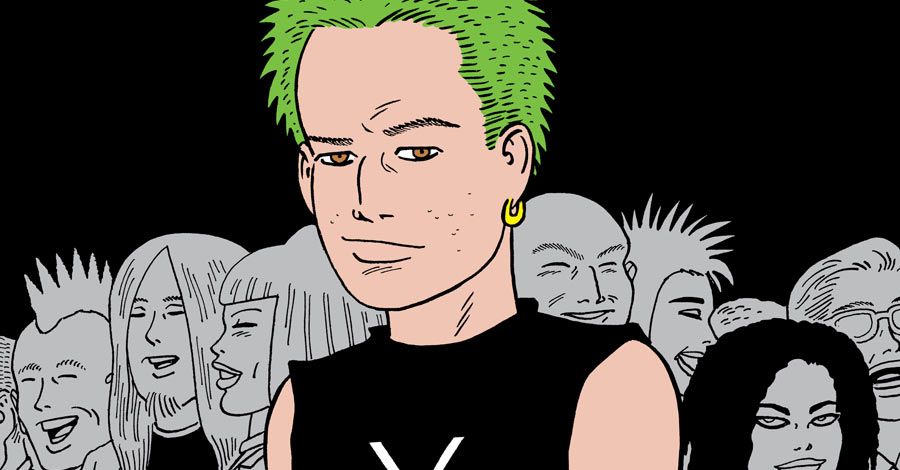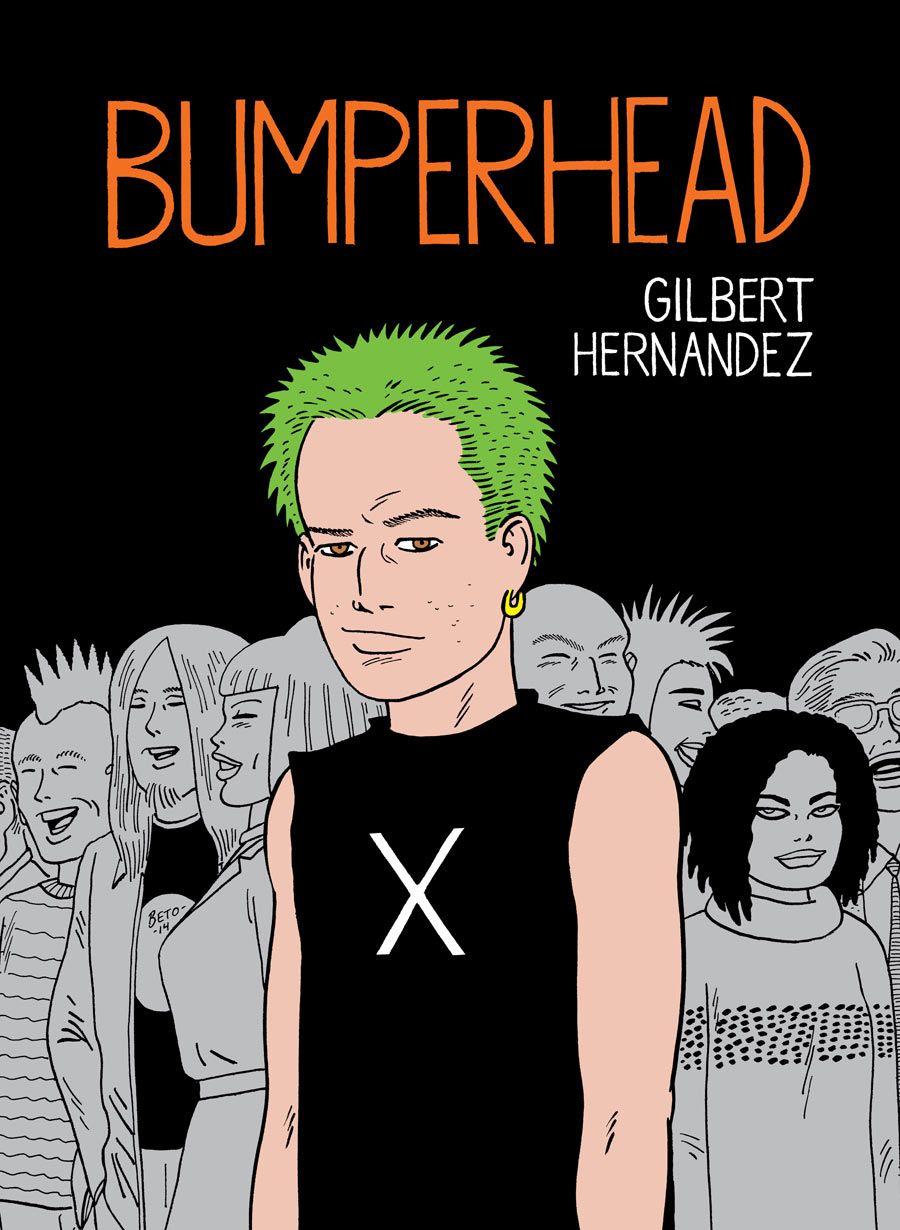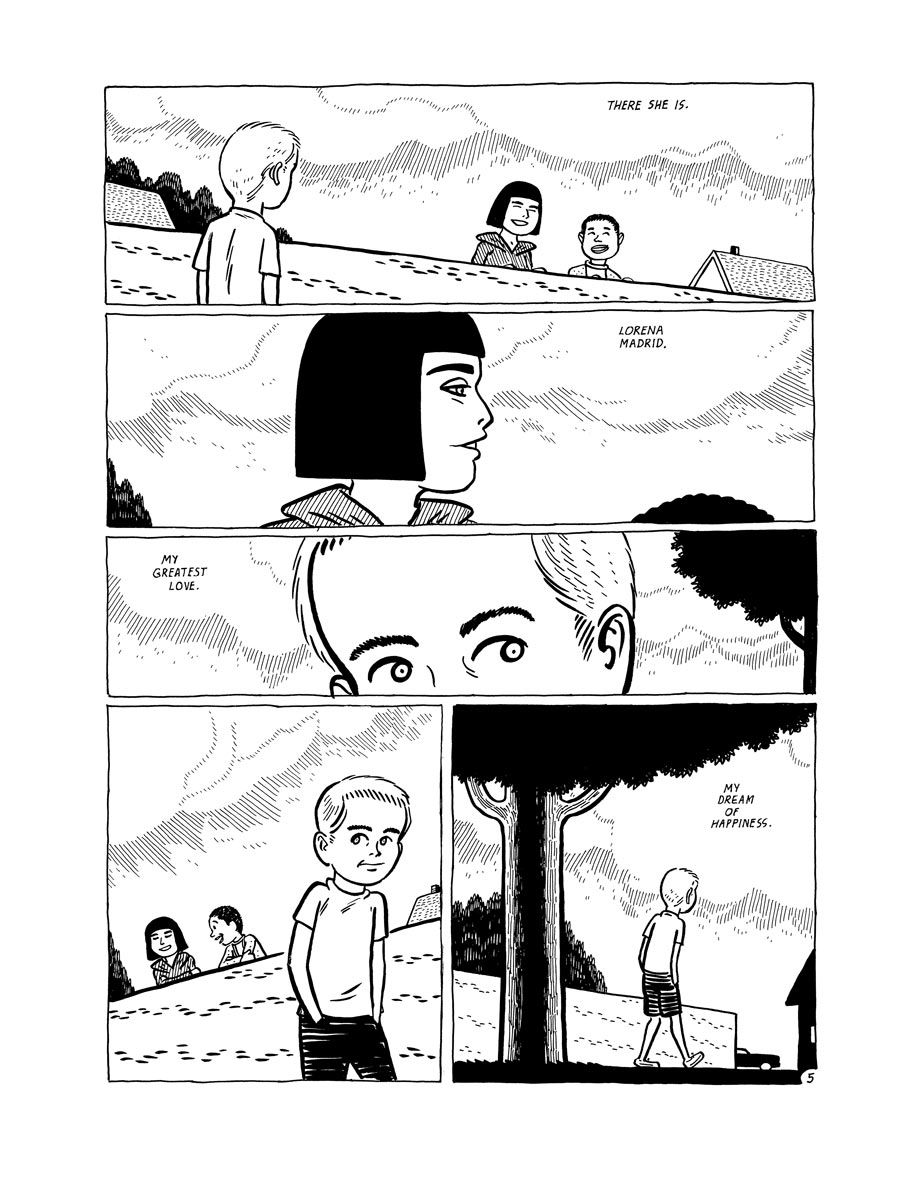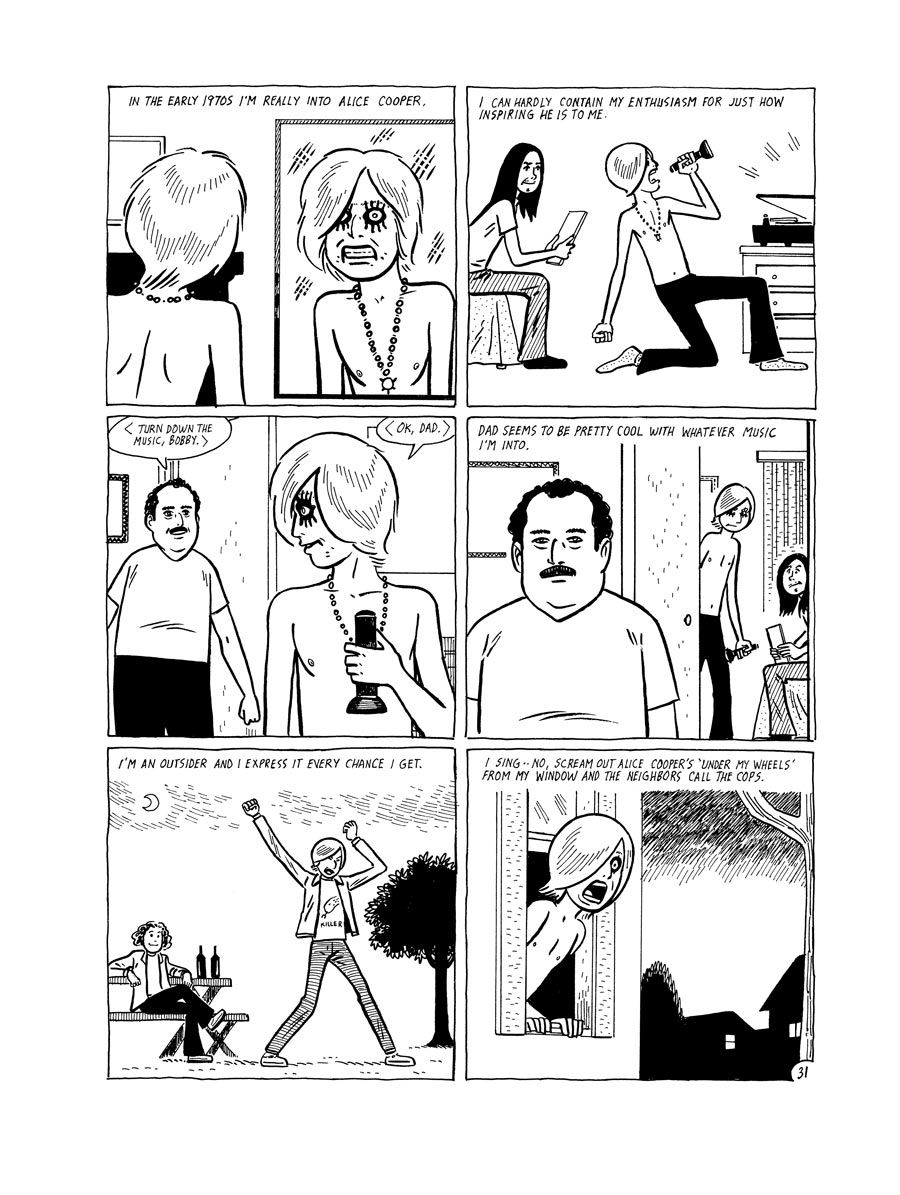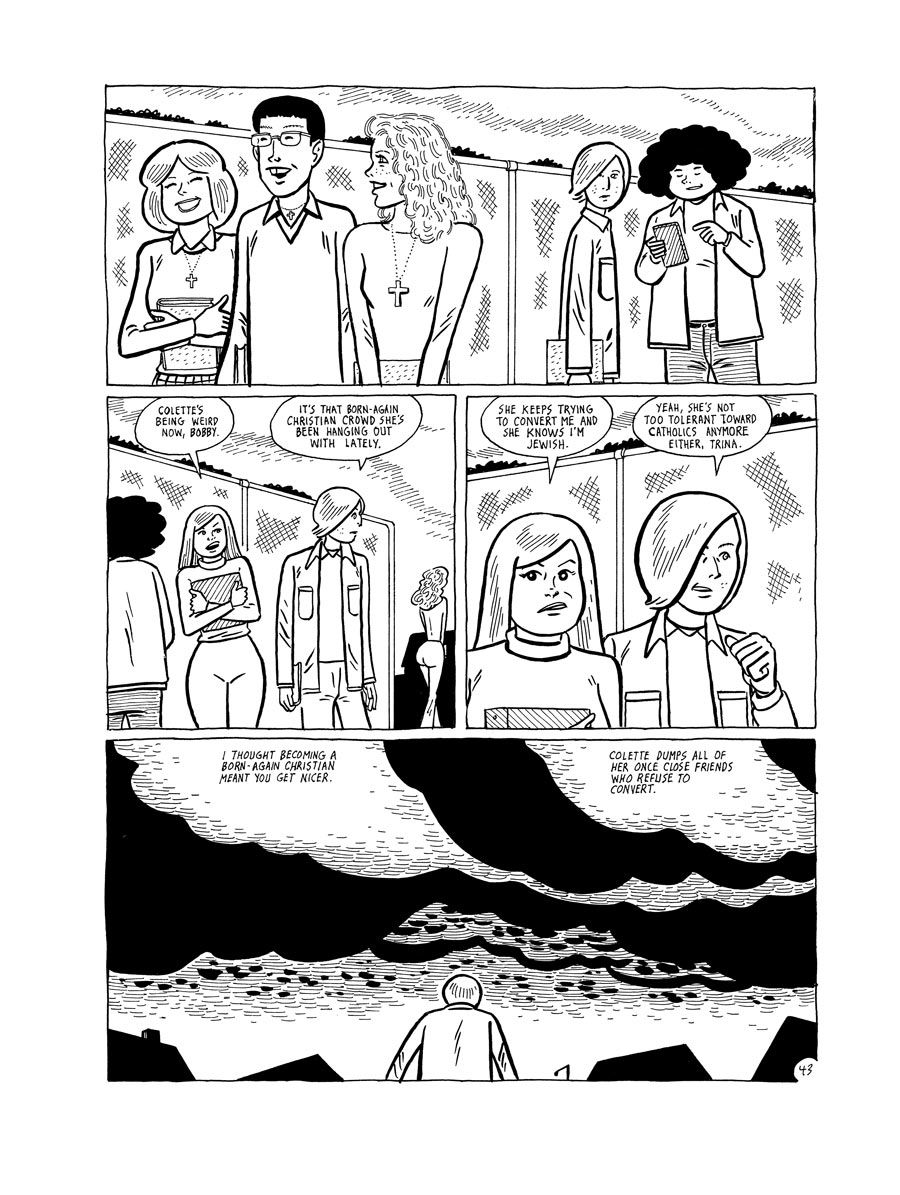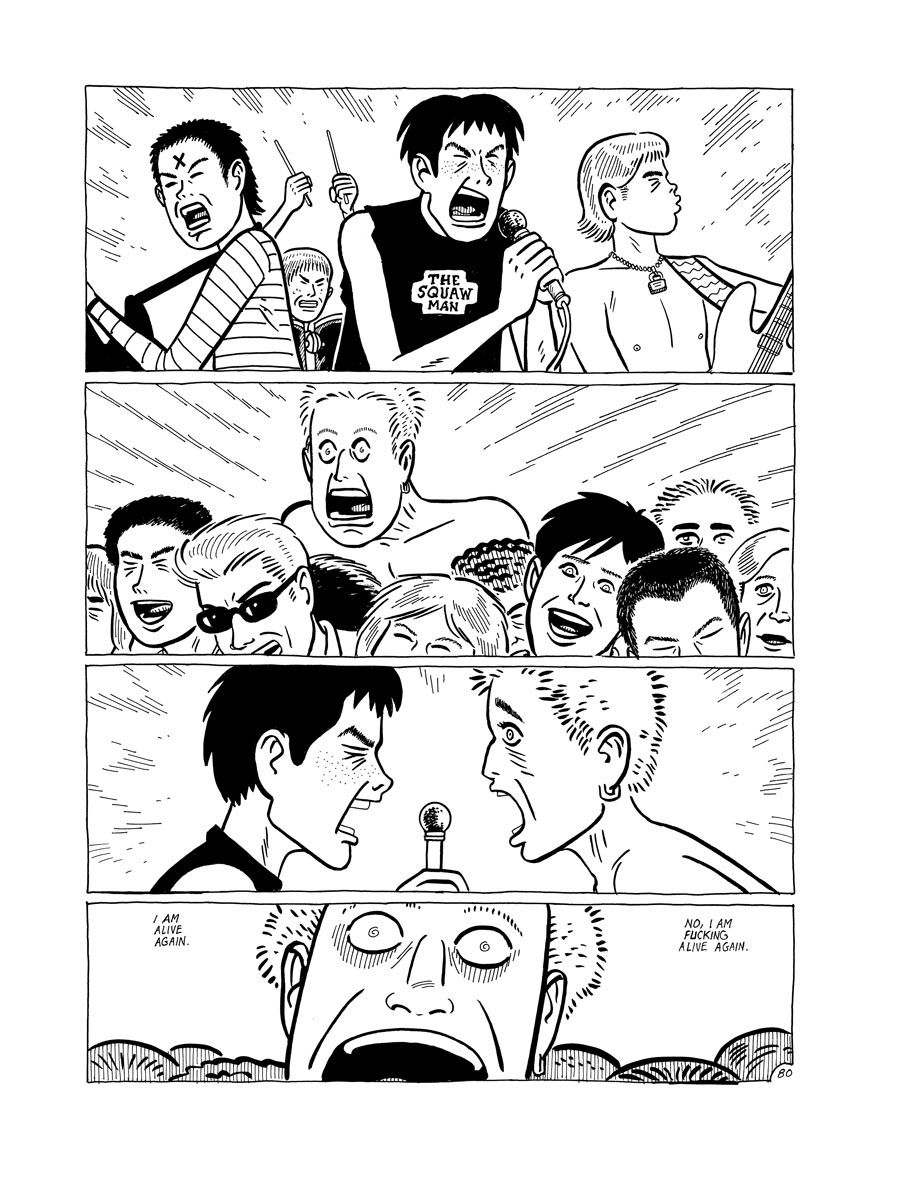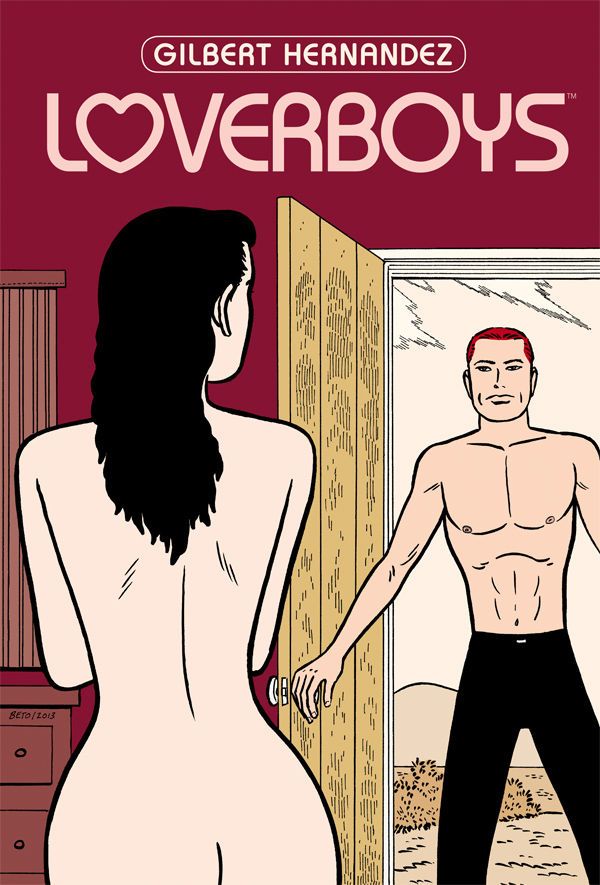One of the brothers behind the legendary comic series "Love and Rockets," for more than three decades, Gilbert Hernandez has been considered not just one of the great cartoonists of his generation, but one of the great storytellers in contemporary America. In recent years, Hernandez's focus has been on a series of inventive and very different graphic novels, from the nostalgic tale of childhood in "Marble Season," to the life of a single man in "Julio's Day," to a series of books that range from horror ("Fatima: The Blood Spinners") to crime stories ("Maria M." and "The Troublemakers") to harder to classify tales like "Sloth" and collaborations with his brother Mario ("Citizen Rex").
His latest book is "Bumperhead," out now, from Drawn and Quarterly. The graphic novel tells the story of a man, from his childhood -- where he's nicknamed "Bumperhead" because of his large forehead -- to old age and the ways his relationship with his parents, his detachment from other people and his love of punk shape his life.
RELATED: Gilbert Hernandez Discusses "Grip" Hardcover
And if one new graphic novel weren't enough, Hernandez has a second, "Loverboys," coming out in October from Dark Horse. In speaking with CBR News, Hernandez explains how very different the two books are, his incredible pace as an artist, how he approached dealing with the passage of time in "Bumperhead" and the most important aspect of his finally winning an Eisner Award.
CBR News: I really liked "Bumperhead," but I was deeply confused by certain aspects. Where did the idea for the book come from?
Gilbert Hernandez: The previous book I did with Drawn and Quarterly was "Marble Season," and that was snippets of my childhood. When I finished that book, I realized that someday I have to do snippets of my teenage days, which are completely different. I had the idea floating around for a while, and when Drawn and Quarterly came by asking about another book, I kept thinking, "The only thing I have in my head right now is my teenage days." I took ideas from a completely different story, "Bumperhead," about a kid with a large forehead that kids make fun of, and I wanted to see where his life went. I put the two together and that's pretty much where it came from. Taking a couple stories, putting them together, and what came out was "Bumperhead."
I kept thinking in the early part of the book where he's a kid that it was, in a sense, the flipside of "Marble Season."
Yeah, it was a little darker, more the pessimistic side of childhood. The injustices we endure and come to grips with and come to accept as a kid.
In "Marble Season," it was about the world kids have built up apart from adults, and this was how kids can't avoid the world of adults.
Right. And I liked that melodramatic route, with the father being a mystery, because that's how things play out for young people. Life is a melodrama. It's not hard facts. Kids experience things very emotionally.
Where did Lalo and his tablet which tells the future come from?
That was an afterthought, because I started out the story as kids in modern times and he's got a tablet. Then the story goes back forty years, and then forty years again backwards in time -- although he gets older. That was a strangeness of the story, where the iPad exists the entire time. Naturally in the past they would have to refer to it as a toy or a science fiction thing.
Was part of the thinking behind that because you wanted to have the punk scenes take place during the punk movement.
Yeah. Like I said, I was putting two stories together and I thought, "This is not going to work." I have the iPad with the kids, and I decided to filter the story with a surreal bent -- even though it's a pretty straightforward story. I wanted to be accurate with the teen days of the early '70s in my experiences. The last part of the story is actually that many years before, in the '30s, but he's older. I don't know if anyone will notice. The clothing is the only thing that shows it.
I was going to ask about the last chapter --
Like I said, I went back from modern times to the early '70s, so that's about forty years. About forty years before that would have been the '30s. I had to be accurate with the clothing. That was it, really. It probably doesn't make sense to a lot of readers, but you're going back in time and he's getting older as you go back in time.
To the extent that "Marble Season" was your childhood, is this your teenage years and your experience of the punk movement?
That middle part of the book -- him being a teenager and liking rock music evolving into punk -- that's pretty close to what happened. Of course, names are changed to protect the innocent, but it's pretty close to how it was. I changed things and combined real people into characters and made up new people.
It was interesting to read, having grown up after the punk movement.
What I wanted to emphasize was my experience and how there was a change. Now, kids are born into it. Punk's already there. The indie scene is already there. I happened to grow up at the time where it was being created and you had to get through a lot of obstacles and a conservative attitude -- not necessarily in a Republican sense. My early teen days were the post-hippie days, and people were just fine with the way it was, and people like me weren't. When you research the ages of a lot of the people that were in the early punk days, they're roughly around my age or a little older.
I would imagine people who were listening to James Taylor and Eagles had no idea what was happening when punk arrived.
They had no idea what was happening. The music had already been around, but only in little spots here and there and they completely rejected it. I remember -- like in the story -- liking certain bands that were really obscure at the time, and they were just completely ignored or dismissed as garbage. When punk came along and so many bands and so many people were involved with it, it really shock things up. That was good for me.
Did punk and those ideas influence you when you started making comics?
I liked punk bands, but then I liked when bands -- particularly The Clash -- took things seriously. That was the first time in my life I could take rock and accept a message with it. Before, music with a message wasn't very aggressive. It was either folk music or soul or jazz, but it wasn't hard rock noisy music that had a message. When punk came out, it was very aggressive music, which I liked, and they had a message they had something to say. That was very inspirational. I wanted to make comics, and the inspiration to say something, and say something personal, a lot of that came from the punk movement.
After the long section of teen years and talking about the punk movement, there's the section of him getting older and it's, well, really sad and depressing.
It's sort of my version of, what if I didn't become a cartoonist? What if I didn't find my way? If I didn't become a cartoonist, I probably would have tried to get a band going. I played music, but I shifted to comics because it was more original and I had more freedom. I didn't have to deal with other musicians. [Laughs] I probably would have pursued music, but I don't know if it would have lasted. Basically, the last third of "Bumperhead" is about what if I hadn't become a cartoonist and didn't have a way to express myself.
He ends up detached from everything and everyone.
It's a safety cache. If you don't get close to anything, it can't hurt you. That's what people like that believe.
The childhood sections are so shaped by the influence of his parents, and you can see how they shape his actions in the later chapters.
I noticed this as a young person -- and I'm seeing it now -- some people tend to live life and take things as things come to you. You deal with things that cross your path, whether it's good or bad, but then as they get older, fewer of those things pass before you in your life. If you're not trained to go after things and be inspired to make a change in your life, most people just let things pass and they become less interested in what's going on in life. They just don't know how to pursue things that would make them happy. I know it's depressing, but that's what I see in some people.
I think that's true, but talk a little about the final page, where he just thinks, it's a good life, why was I so angry?
I think some people just forget what they were angry about. It's not worth holding onto that anger, so you almost get to a point where you don't even remember why you're angry. You don't remember what inspired you to fight against what you felt was injustice. People just get old. I see that in my life today with people I used to once know. You just give up and mellow out.
The anger remains, but everything else has started to fade.
Some people stay angry, and it's not good for them, and other people forget about being angry, and that's not good for them -- but some people are okay with it. I decided to do a character that wasn't sure what was going on. Like, I'm old now, what happened? [Laughs] He decided to have peace with it.
It's funny, because the part where people feel like I was stretching the truth was all the girls I knew in high school. [Laughs] They say, well that's got to be a fantasy. No, it's just that I dealt with it in a microcosm. It seems like it happened all the time, like it was girls falling all over me. No, that was over a period of years.
You summed up that part of high school in just a few pages.
Yeah -- there's one page where the character is with three or four different girls. That happened over time. And not all the relationships were that intense. That part is not about me. The part about me is that I knew girls and spent time with them, but it wasn't like I was Joe Stud or anything. It might come off that way to people. [Laughs]
Along similar-ish lines, this year you have another new graphic novel, "Loverboys." Could you talk about it?
That was after I'd done "Bumperhead" and I'd been doing darker themed comics. "Fatima" dealt with zombies, and "Maria M." was about gangsters, and "Love and Rockets" has some darker things going on. Even if "Marble Season" was pretty light, "Bumperhead" was gloomy and I decided I wanted to do a bittersweet romance story. It turns out to be kinda depressing after all, but I wanted to do a romantic story to get away from all that other stuff, but like I said it turns out to be a very melancholy story. Maybe I'll do a happy one, someday. [Laughs]
This year you've made "Bumperhead" and "Loverboys" plus a new "Love and Rockets" plus a reprint of "Fatima." Is this your new normal pace?
It's something that I can do. It's work and it's tiring. I don't plan on doing so many graphic novels at once, let's put it that way. It's just the way that things are scheduled with the publishers. After I finish a book, I can't just go back to the same publisher and do another one. I jump to another and start a new project. I have to be ahead all the time, producing material. That's why it ended up coming out at the same time. "Loverboys" might be the quickest long story that I've ever done. The time that I put into it was pretty brief, just a couple months. None of it's rushed. I put the same care into it that I put into everything. But I can imagine a day when I go, "Hey, I can't put out two new graphic novels a year anymore." [Laughs]
When you're thinking about your next project, are you thinking about having to make something different?
Usually it depends on what I'm doing at the time. If I'm doing a heavy work, a crime story or horror story -- or even just a downer story -- as I'm doing it, I get tired of it myself. This is a downer, let's lighten things up next time. I'm always thinking ahead of what to do next. I try to shift gears as much as I can with each new project. It always ends up being a little dark, no matter what the subject is. [Laughs] Now I really have to try to do something different because I've got "Loverboys" and "Marble Season" and "Bumperhead" and the reprint of "Julio's Day," I don't want to repeat those books.
Do you ever stop and think, this is a Fantagraphics book, this is a Dark Horse book, this is a Drawn and Quarterly book, or does that not cross your mind?
It does a little bit. When I did "Marble Season," I said, this is a Drawn & Quarterly book. I want this for all ages. Some of my stuff at Fantagraphics is pretty rough, visually, whether it's sex or violence, so I just didn't want to go to another publisher and do that. With Dark Horse, I think of the kinds of books they publish, so I went ahead and did this heavy, violent zombie story because they're more into that dark genre stories. Fantagraphics is more indie -- closer to the way of indie music -- than the other publishers. With each publisher, I try to focus and express myself in a different way. Sort of having a split personality with each publisher. [Laughs]
I thought of this after rereading "Bumperhead," but in the past few years you've made "Julio's Day," which is the story of a life, "Maria M.," which is about a life and memory and distortion of the past. Not that you've never dealt with this previously in your career, but you seem to be interested, recently, in depicting time and how stories and lives play out over time in different ways.
That's not a conscious decision. I don't really think about those types of themes, where a few books might parallel each other. I don't go that far into thinking about those implications. They usually just turn out as they turn out. I don't want to repeat what I'm doing. I don't want to make the same story with different characters. A lot of the themes and a lot of the things that end up in my stories I'm not really conscious of until I'm almost done with the book.
Is that how you've always worked?
It's more instinctive to me. I feel the stories out more than plan them out Alan Moore-style. I just feel out moment to moment and then corral it after I've felt it out and bring it together into a story.
You're planning the story moment to moment, but how they add up is something you discover.
"Bumperhead," "Julio's Day" and "Maria M." are similar in that they are about a life that we see at one point at the beginning and then we see how it ends, so yeah, they're more about characters lives. It's funny that you brought that up, 'cause I didn't really think about that until right now.
Last year you received the PEN Center USA's Graphic Literature Award, and this year you and your brother won your first Eisner Awards. I was curious what they meant -- if anything.
Well, the PEN Center one was just a surprise. I had no idea even what the award was. What I had to do to accept the award in Beverly Hills was very surreal. I had to dust off my old suit and attend a dinner where a bunch of Hollywood folks were presenting awards and hanging out. I was waiting back stage to go on stage to accept it, and Harrison Ford congratulated me. I was like, "Hunh, what?" [Laughs] He was very nice. Then I got up on stage, and Governor Jerry Brown is sitting there looking me, and Anjelica Huston, Oliver Stone, all smiling at me, waiting for me to perform. [Laughs] It was just too surreal. But everyone was very gracious and very nice and it was really an honor to experience that.
The Eisner was a surprise because -- I'm going to paraphrase my brother -- the award was nice, but the real nice part about it was everybody congratulating us. People were really happy that we were getting that kind of notice that night.
We hadn't felt snubbed. Over the years, we noticed that different kinds of books would win. Like a few years ago, it was "Batman" being nominated and winning. It changes every year. I recognized the pattern and thought, someday, maybe. The award itself isn't that important to me. I mean, I appreciate it, but I don't feel like I'm competing with my peers. I don't feel like my book is better than someone else's. Everybody's working really hard, and everybody likes different types of comics. When you get an award, it's really nice, but as far as who's better than the other person, that's up in the air. I won the award in front of my wife and daughter. My daughter wanted to win just so she could see her dad go up, so that was important to me, too.
"Maria M. Book 2" comes out next year. What else are you working on?
Dark Horse is going to reprint another book I did for Vertigo, "Grip." Then they're going to do a reprint of "Girl Crazy." That's been out of print. I don't have any plans with Drawn and Quarterly. Fantagraphics will have the new "Love and Rockets" -- as ever. "Maria M. Book 2" was pushed back a little bit. I had planned that to be at the end of this year, but it's going to be early next year. I might have another graphic novel out at the end of the year that I plan to do. That depends if I can squeeze it out.

